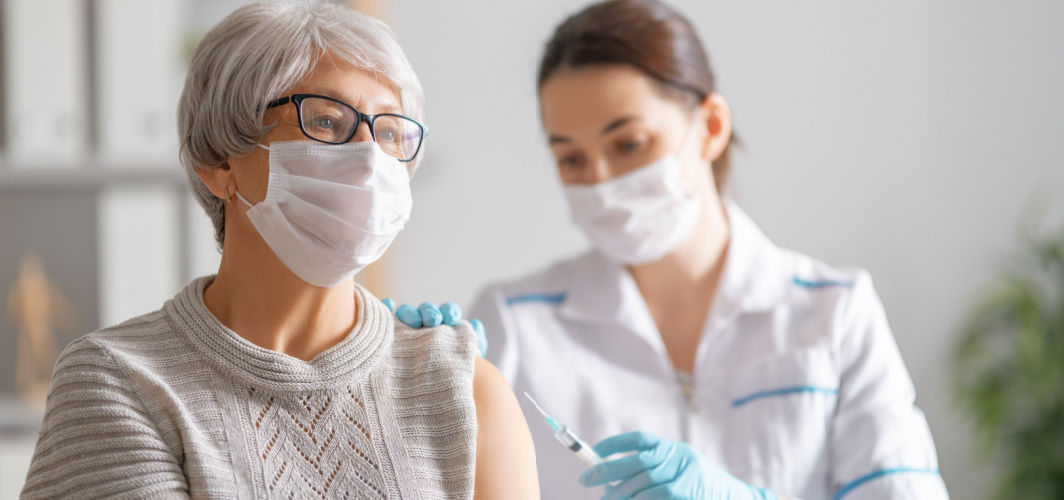General Health
Why Adults Should Get Vaccinated?
8 min read
By Apollo Pharmacy, Published on - 27 September 2023
Share this article
0
0 like

While we are well aware that newborns require a number of vaccinations to protect themselves from deadly diseases, there are some vaccines that are administered during adulthood. Adult vaccination safeguards individuals from preventable diseases and also helps in achieving herd immunity, thus protecting vulnerable populations. Furthermore, immunization against deadly diseases reduces the burden on healthcare systems.
Benefits of Adult Vaccination
Vaccination plays a vital role in safeguarding public health by preventing the spread of infectious diseases. Over the years, vaccines have proven to be highly effective in reducing the incidence of several diseases. Some of the benefits of adult vaccination include:
- Vaccines have played a crucial role in eradicating or significantly reducing the incidence of various infectious diseases such as polio, measles, and hepatitis B.
- By getting vaccinated, adults contribute to the overall decrease in disease burden.
- Newborns, pregnant women, and the elderly are more susceptible to severe complications from infectious diseases. By receiving recommended vaccines, adults help create herd immunity, which provides indirect protection to these vulnerable populations.
- Vaccines for adults such as the flu vaccine, hepatitis B vaccine, and pneumococcal vaccine can safeguard you against illnesses like influenza, pneumonia, and hepatitis. These diseases can be serious, especially in adults with weakened immune systems or underlying health conditions.
- Vaccines for adults can help prevent deadly diseases and potential complications such as organ damage, respiratory problems, and even death.
- Vaccination can help prevent hospitalisation due to serious illnesses. By protecting yourself against diseases like influenza and pneumonia, you reduce the risk of severe respiratory infections that may require hospital care.
Recommended Vaccines for Adults
Let us delve into some recommended vaccines for adults:
1. Influenza Vaccine (Flu Shot)
Influenza can cause severe illness and even death, especially in older adults and those with chronic health conditions. Getting the influenza vaccine annually reduces your risk of contracting the flu and its complications.
A. Effectiveness: While it may vary every year due to different strains circulating, studies have consistently shown that the flu shot reduces the severity of illness and hospitalisations.
B. Side effects: It's important to note that the vaccine is safe and well-tolerated for most individuals. Side effects are usually mild and temporary, such as soreness at the injection site or minor body aches.
2. Pneumococcal Vaccine
Pneumococcal disease is one of the leading causes of pneumonia and is caused by a bacterium called Streptococcus pneumoniae. If left undiagnosed, it can also lead to other serious infections like meningitis and bloodstream infections. The pneumococcal vaccine helps protect against these infections by providing immunity against the bacteria.
There are two types of pneumococcal vaccines recommended for all adults aged 65 years and older, as well as younger adults with certain medical conditions. These include:
- Pneumococcal conjugate vaccine (PCV13)
- Pneumococcal polysaccharide vaccine (PPSV23)
3. Hepatitis B Vaccine
The hepatitis B virus (HBV) can cause both acute and chronic infections. While most adults recover fully from acute hepatitis B, others may develop chronic infections that can lead to serious health complications such as cirrhosis of the liver and liver cancer. This is why the hepatitis b vaccine dose for adults is important.
The hepatitis B vaccine for adults is recommended for individuals who are at higher risk of contracting the virus. This includes:
- Healthcare workers
- Individuals with multiple sexual partners
- People who inject drugs
- Those with certain medical conditions like diabetes or chronic liver disease
4. Tetanus, Diphtheria, and Pertussis (Tdap) Vaccine
A. Tetanus: Tetanus, also known as lockjaw, is a serious bacterial infection that affects the nervous system and can be life-threatening. Clostridium tetani, the bacteria that cause tetanus are commonly found in soil, dust, and faeces. When these bacteria enter a wound or cut, they produce a toxin that affects the muscles and nerves.
Getting a tetanus booster shot is crucial for adults because the immunity provided by previous vaccinations wanes over time. Consider talking to your healthcare provider about a tetanus vaccine schedule for adults.
B. Diphtheria: Diphtheria is a severe bacterial infection caused by Corynebacterium diphtheria. It can result in serious symptoms such as difficulty breathing, irregular heart rhythm and even death. Doctors recommend Tdap vaccine for infants, children, teens, and adults to prevent diphtheria.
C. Pertussis: Pertussis, also known as whooping cough, is a highly contagious respiratory infection caused by the bacterium Bordetella pertussis. It can cause severe coughing fits, difficulty breathing, and even pneumonia. While pertussis is often thought of as a childhood disease, adults can also contract and transmit it. By receiving the Tdap vaccine, adults not only protect themselves but also help prevent the spread of whooping cough to vulnerable populations such as infants who are at higher risk of severe complications from the disease.
5. Varicella (Chickenpox) Vaccine
If you have never had chickenpox or received the vaccine in childhood, it is recommended to get vaccinated as an adult. Chickenpox can be more severe in adulthood, so getting immunised can help prevent complications.
Consult your healthcare provider for more information on the chickenpox vaccine or varicella vaccine for adults.
6. Human Papillomavirus (HPV) Vaccine
This vaccine is recommended for adults up to a certain age to protect against HPV infection, which is a major cause of cervical cancer, as well as other types of cancer. HPV vaccine is also available for men and women up to age 45 who want to reduce their risk of HPV-related diseases.
Is Adult Vaccine Safe?
One of the major concerns that people have about vaccines, regardless of their age, is the safety and potential side effects associated with them.
- Vaccines go through rigorous testing and monitoring processes before they are approved for use. This includes conducting extensive clinical trials involving thousands of participants to assess their safety and efficacy.
- Regulatory bodies like the World Health Organization (WHO) and the Indian government's National Regulatory Authority (NRA) closely monitor vaccine safety, ensuring they meet strict standards before being made available to the public.
- Adverse events following vaccination are rare, and any reported cases are thoroughly investigated to determine if there is a causal link between the vaccine and the reported side effect.
Myths Associated with Adult Vaccines
Here we're addressing common misconceptions about the side effects of vaccines:
- "Vaccines cause autism": Numerous studies have debunked this myth and it has been concluded that no scientific evidence linking vaccines to autism.
- "Vaccines weaken the immune system": Vaccines strengthen the immune system by allowing it to recognise and fight off specific pathogens.
- "Vaccines contain harmful ingredients": Vaccine ingredients are carefully chosen to ensure safety. Commonly used ingredients like aluminium salts and formaldehyde are present in very small amounts and pose no harm when administered according to the recommended schedule.
Vaccine Effectiveness and Duration of Immunity
Vaccines work by introducing a harmless part of the virus or bacteria into the body. This stimulates the immune system to recognise and respond to the specific pathogen, without causing illness.
Once vaccinated, the body produces antibodies that can quickly recognise and neutralize the actual pathogen, if you get exposed to it in the future.
Why Do You Need Booster Vaccines?
It's important to understand that while vaccines are highly effective, their protection may decrease over time due to a concept called waning immunity. This means that the immune response generated by the vaccine gradually declines, making individuals more susceptible to infection again. To address this issue, booster doses are recommended for certain vaccines.
Strategies to Improve Vaccination Rates Among Adults
Strategies to improve vaccination rates among adults include:
- Provider Recommendation: Healthcare providers should actively recommend vaccines for adults, emphasising the importance of staying up to date with vaccinations.
- Vaccine Reminders: Implementing reminder systems, such as phone calls, text messages, or emails, can help remind adults about upcoming vaccinations and encourage them to schedule an appointment.
- Education and Resources: Healthcare providers can provide educational materials and resources about vaccines, addressing common questions and misconceptions. This helps patients make informed decisions regarding their vaccination status.
- Integration into Routine Care: Incorporating vaccines into routine healthcare visits ensures that adults have easy access to vaccinations without needing to schedule separate appointments.
- Collaborative Efforts: Collaboration between healthcare providers, public health organisations, and community stakeholders can help create awareness campaigns and programs that promote adult vaccination.
Takeaway
Adult vaccination is crucial for personal and public health. By getting vaccinated, adults can protect themselves from various diseases and prevent the spread of infections to others. Remember, vaccines are a valuable tool in preventing diseases and promoting well-being. Stay up-to-date with your vaccinations to protect yourself and those around you. Since flu season is around the corner, you can protect yourself from the adverse effects of this viral infection through a flu shot.
FAQs
Q. Why is it important for adults to get vaccinated?
Vaccinations are crucial for adults as they help protect against various diseases and infections. Vaccines can prevent serious illness, hospitalisation, and even death.
Q. How often do adults need to get vaccinated?
The vaccination schedule for adults varies depending on the vaccine. For example, the flu vaccine is recommended every year, while Tdap boosters are needed every 10 years. It's important to consult with your healthcare provider to determine the appropriate schedule.
Q. Are there any side effects of adult vaccinations?
Like any medical intervention, vaccines can have side effects. However, serious side effects are extremely rare. Common side effects include soreness at the injection site or mild flu-like symptoms that resolve within a few days.
Q. Can adults benefit from COVID-19 booster shots?
Yes, COVID-19 vaccine boosters for adults are beneficial, especially for those who are at high risk or have weakened immune systems. Boosters help strengthen immunity and provide additional protection against the virus.
Q. Can vaccines prevent severe illnesses in adults?
Yes, vaccines can prevent severe illnesses in adults. For example, the flu shot reduces the risk of hospitalisation and death from influenza-related complications. Vaccines also play a crucial role in preventing the spread of contagious diseases.
General Health
Leave Comment
Recommended for you

General Health
Halasana to Bhujangasana: 5 Yoga Poses To Manage Thyroid Problems
Some yoga poses like Halasana, Sarvangasana and Matsyasana can help improve the functioning of the thyroid gland, thereby reducing the risk of any thyroid disorder. Read this article to know more about these asanas.

General Health
How To Treat Ear Pain In Children
Discover effective ways to treat ear pain in children. Learn about common causes, the latest guidelines, and lifestyle factors that can help alleviate discomfort.

General Health
Does Chronic Fatigue Syndrome Cause Persistent Tiredness?
Chronic fatigue syndrome (CFS), also known as myalgic encephalomyelitis (ME), is a long-term illness characterized by extreme tiredness.
Subscribe
Sign up for our free Health Library Daily Newsletter
Get doctor-approved health tips, news, and more.
Visual Stories

The Best Exercises for Controlling Blood Sugar Levels
Tap to continue exploring
Recommended for you

General Health
Halasana to Bhujangasana: 5 Yoga Poses To Manage Thyroid Problems
Some yoga poses like Halasana, Sarvangasana and Matsyasana can help improve the functioning of the thyroid gland, thereby reducing the risk of any thyroid disorder. Read this article to know more about these asanas.

General Health
How To Treat Ear Pain In Children
Discover effective ways to treat ear pain in children. Learn about common causes, the latest guidelines, and lifestyle factors that can help alleviate discomfort.

General Health
Does Chronic Fatigue Syndrome Cause Persistent Tiredness?
Chronic fatigue syndrome (CFS), also known as myalgic encephalomyelitis (ME), is a long-term illness characterized by extreme tiredness.